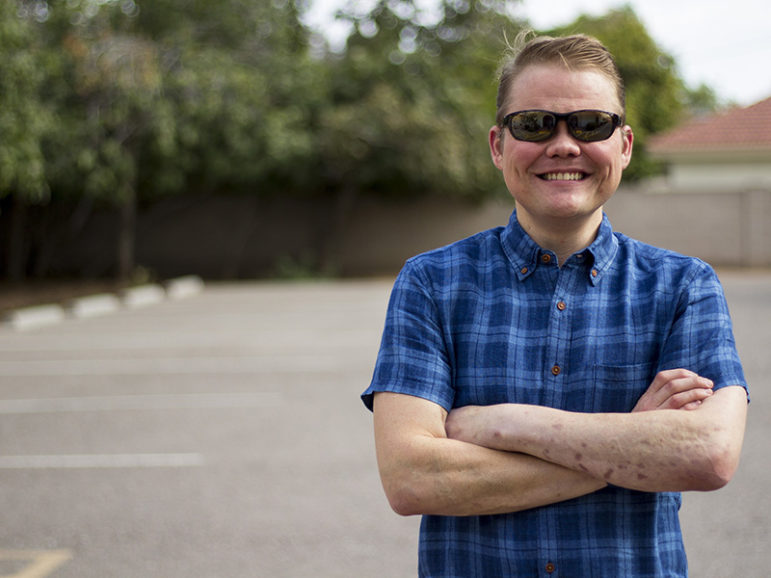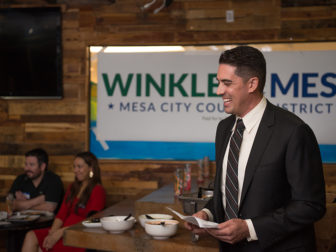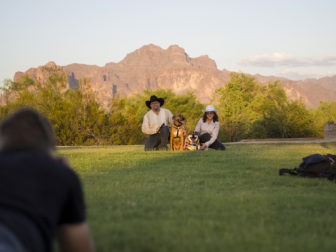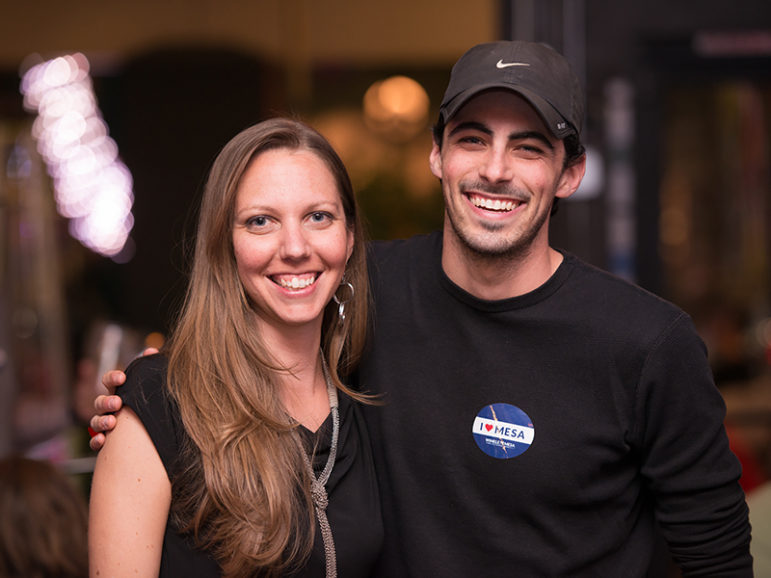MESA, Ariz. (RNS) Conventional wisdom says atheism is the third rail of American politics — the candidate who admits to not believing in God will drop in the polls like a rock.
Except in Arizona; except in the current election.
While there have always been a few states where voters don’t blink at candidates with unconventional religious beliefs (think California, Oregon and Washington), Arizona has long been a bastion of Republican Party conservatism where Christian voters hold sway and tend to vote for their own.
[ad number=“1”]
But as Arizona voters head for the primary on Aug. 30, they will have nine openly atheist or humanist candidates before them — more than in any other state. Most have run — and lost — before. But this year, a couple have a fighting chance, at least at the local level or state level, and await the voters’ first judgment.
And while their platforms are widely divergent — one candidate promotes legalizing marijuana and another pair are animal rights activists — they have one thing in common. All have hired a small, Tempe-based startup communications firm that highlights, rather than hides, their secular values.
“We are trying to be the serial entrepreneurs of the humanist movement,” said Evan Clark, 27, one-half of Spectrum Experience, the humanist-based firm that manages these candidates.
[ad number=“2”]
Across the Formica tabletop in a strip-mall breakfast spot that sometimes serves as Spectrum’s office, his partner, Serah Blain, 37, added: “We want to break ground. We are trying to start a movement, not win a race.”
The starting line
Blain and Clark met in 2011 when both were active in humanist circles, she as an Arizona state lobbyist for the Secular Coalition for America, he as head of his California college’s Secular Student Alliance.
In 2014, Blain began working with James Woods, a humanist running for Congress from Arizona’s 5th District. When Democratic Rep. Kyrsten Sinema was elected from the adjacent 9th District in 2012, she was touted by some secular activists as the first open atheist in Congress — a label she instantly rejected. Many in the secular community were angered and saddened by her actions, which they saw as more politically expedient than honest.
Woods — with help from Blain and Clark — decided to highlight his lack of religious beliefs. And though he lost to Republican Matt Salmon, a Mormon, in this heavily Republican district, many Phoenix-area progressives saw Woods’ candidacy as a tipping point.

When James Woods, a humanist, ran for Congress in 2014, he started a trend. There are now nine openly nontheistic candidates running for local, state and national office in Arizona, all of them contracted with a single communications firm, The Spectrum Experience. Photo courtesy of Evan Clark
“James was the incubator of our idea of what a humanist campaign can look like,” Clark said. “We tried to create a humanist platform, a humanist brand that was credible. We went for things people are often afraid to talk about — humanism and feminism.”
READ: God? Meaning of life? Many Americans don’t seek them in church
But Woods’ lack of religion was an issue in 2014. On the one hand, it gained him national attention. On the other, local Democrats distanced themselves from him. At least one asked Spectrum to remove a picture of her with Woods posted on Spectrum’s Facebook page because she didn’t want to be associated with his atheism. A few people said they wanted to vote for Woods, but his lack of religious belief was a deal-breaker.
[ad number=“3”]
On the night Woods lost, Blain received condolence calls from secular activists all over the country. She was too busy partying to take them, celebrating the result as a milestone.
“I think it started a precedent in Arizona,” she said a week before the upcoming primary over an enchilada lunch. “It broke the glass. And that was the point. In a lot of ways it was a giant PR stunt to bring forward issues that we care about and get them discussed.”
Woods, sipping an Arnold Palmer at Blain’s left, said: “Serah said to me, ‘You are going to lose and you are going to lose big. But let’s go for it.'”
Pushing away her half-eaten plate, Blain added: “This time is different. Things have changed.”
Shifting politics
Arizona is known as a Republican mainstay, a bedrock conservative state. The last time Arizona went Democratic in a presidential election was in the 1950s. Its voters have elected Sen. Barry Goldwater, Sen. John McCain and the nationally famous — and infamous — Republican Sheriff Joe Arpaio.
Sixty-two percent of the state’s Republican voters live in Maricopa County, the most populous area around Phoenix, Mesa, Tempe and Surprise. Most of Spectrum’s candidates live here, or their districts overlap it.
By 2010, conservative Republicans — many with the support of evangelicals and Mormons — gained a supermajority in the Arizona Legislature. They pushed a number of laws that were considered extreme by critics — among the strictest abortion limits in the nation, defunding of Planned Parenthood, and allowing businesses to refuse service to LGBT customers if they felt it conflicted with their religious beliefs.
READ: Reason Rally organized atheist vote
Most of the legislation was supported by the Center for Arizona Policy, a conservative Christian organization. Much of it was defeated or vetoed by then-Gov. Jan Brewer, a Republican.
Those proposed laws may have been something of a wake-up call. John C. Green, director of the Ray C. Bliss Institute of Applied Politics at the University of Akron, says yes, Arizona is traditionally Republican and conservative, but that is tempered by a strong libertarian vein that may have been strengthened in the wake of those proposed laws.
“Libertarians are skeptical about all forms of government, but they are also skeptical about religion in government,” Green said. “So just on the face of it, the arguments these candidates are making are plausible, and especially in the Phoenix area there would be a constituency for the kind of arguments they are making.”
Meanwhile, the Arizona population is changing, Green said. People are moving in from more liberal states, such as California; left-leaning Latinos show signs of turning out to vote in higher numbers; and millennials — generally less religious than preceding generations — are showing a growing interest in politics.

Mikel Weisser is on his third run for Congress, but this time he has hired a humanism-based communications firm to help his campaign. Photo courtesy of Evan Clark
“Arizona may want to be the Mississippi of the West — that is what we used to call it,” said Mikel Weisser, a candidate for Congress from Arizona’s 4th District for the third time, this time with Spectrum’s help. “But Arizona has a pretty large and growing millennial population who are going through the realization that these religious statutes are being used for hate and division. They are saying we have to move beyond ‘God hates fags.'”
Crafting a ‘political humanism’
Weisser, 57, represents one extreme of Spectrum’s candidates. His platform rests on the legalization of marijuana, and he always wears his medical marijuana card on a lanyard around his neck. Over his left breast pocket is a Bernie Sanders button — the “i” in Bernie dotted with a cannabis leaf — and in his right hand is a ceramic marijuana pipe, which he alternately waves about and uses as he talks about his campaign.
He is a long shot to win his conservative district.
Then there is Ryan Winkle, a clean-cut, 37-year-old father and businessman who goes door to door in the Mesa neighborhood he grew up in wearing dress shoes and a tidily buttoned blue polo shirt with his “Winkle for City Council” emblem embroidered over his heart.

Ryan Winkle, a humanist, is involved in a close race for City Council in Mesa, Ariz. Photo courtesy of Jim Hesterman
Winkle has a shot at winning the Aug. 30 primary and is possibly being groomed by the local Democratic establishment for other, higher offices.
The men — and all of Spectrum’s candidates — have two things in common: They are not traditionally religious, and they have asked Spectrum to highlight what they call the humanist aspects of their platforms.
Blain and Clark think of that platform as “political humanism” — values that promote the greater good of all people, regardless of race, religion or economic status. They include a living wage, health care access (including abortion and birth control), improved education, the eradication of poverty, the advancement of science and reason.
For Winkle, it is even more simple.
“I am a Mesa citizen, a human being, an American before I am anything else,” Winkle said as he deposited literature on closed doors in the 99-degree heat. “My values aren’t pro-choice or religious, but are based on being part of the community. So I don’t have to find common ground with voters on religion. I find it with them in the community.”
Tone down or amp up?
But are humanist values enough to win an election? Or are they something that can sink a candidate?
About half of Spectrum’s candidates said their lack of religion has not been a problem. But the other half have had some pushback.
Cara Prior, who is running for the Arizona House while her husband, Scott, runs for the state Senate, said she had been asked by a Democratic Party official to “tone down” her atheism because it didn’t play well. She has not. Weisser said other Democrats in his district asked him not to run because he doesn’t “live up to their Christian values.”
And most of Spectrum’s candidates acknowledge that they are unlikely to win. But that, they said, is not the point.

Scott and Cara Prior are running for the Arizona Senate and House, respectively. Both are nontheists and Cara, an atheist, has been asked by party officials to refrain from talking about it. Photo courtesy of Jim Hesterman
“The chances of us winning are slim,” said Scott Prior, as he and Cara, both in cowboy hats and holding one of their dogs by a leash, sat against a sunset mountain for official campaign pictures. “But if we do it right, the message we can bring for the future is important enough.”
Juan Mendez is the only one of Spectrum’s clients running as an incumbent; he was elected to the state House in 2012. At that time, he was not public about his lack of religious faith. Now, he is embracing his humanism with Spectrum’s help.
“Serah and Evan created a brave space where it made me want to go out and stand up for people who choose not to associate with religion,” Mendez said during a break in a day of canvassing. “They encouraged me to see a bigger picture. By myself, I probably would have just thought about keeping myself safe. But the fact that there were other people out there I would be helping — it made me feel like an opportunity would fall away if I didn’t” run as a humanist.
For Clark and Blain, the end of the race isn’t nearly as important as the race itself.
“In James’ (Woods) campaign, we wanted to normalize atheism in politics, and I think we did it,” Blain said. “This time, we asked: Can we inspire people to run as atheists? And we’ve done that.”
The next campaign
Which begs the question — if only one or two of their candidates has a shot at lasting beyond the primary, what’s next for Spectrum Experience?
The question is a complicated one. Blain, who considers Arizona home, spends a lot of time in Florida, where her two children live. Clark, originally from Massachusetts, pines for California. Both crash with friends or significant others, and neither can remember a full day off since January.
After handing out fliers for Winkle one morning, the pair reconnoitered at the Humanist Society of Greater Phoenix, a former Mesa home-turned-community center where they meet in a room cramped with coffee machines, microphones and computers. For about a half-hour between appointments with candidates, they talk about what direction Spectrum will take after November.
They talk about reviving a popular humanist podcast series they produced. They talk about training other secular activists in other states to do what Spectrum does. They talk about writing legislation, about promoting Darwin Day, about focusing on education and lobbying.
But they always seem to come back to one subject — fronting a slate of humanist candidates in the Prescott area, two hours to the north, and running their campaign from start to finish.
“Is the goal to run one, nail political humanism and then go on to other stuff,” Clark asked, his fingers clicking across his computer, seemingly independent of his words. Then he asks Blain with a smile, “Are you ready to run for Congress in 2018?”
Deadpan, she replies: “Yes. Unless you do.”





